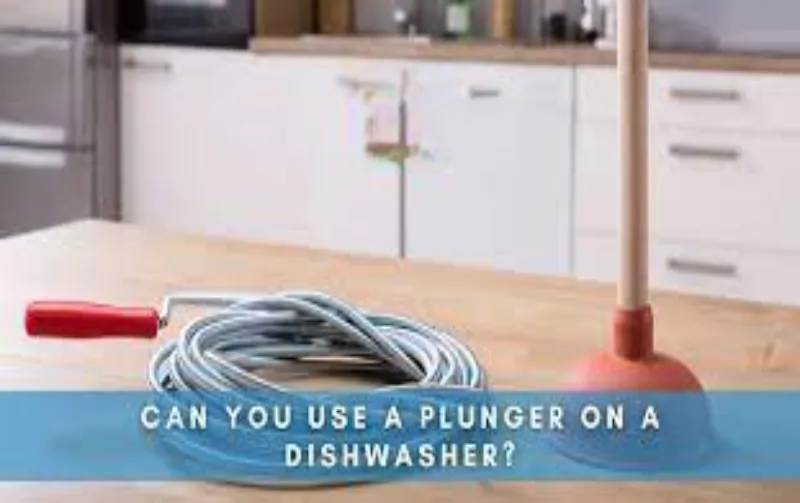Can You Use a Plunger on a Dishwasher? Clearing Myths!
We may earn affiliate fees for purchases using our links (at no additional cost to you).
Yes, you can use a plunger on a dishwasher to address clogs. Always ensure the dishwasher is off and empty before plunging.
Dealing with a clogged dishwasher can be a frustrating experience, often hindering your kitchen’s workflow.
A common household plunger could be the tool you need to tackle this issue, saving you time and the expense of calling in a professional.
Unclogging a dishwasher with a plunger is a simple DIY fix that requires minimal effort and know-how.
It’s an effective first step that can dislodge food particles and grease buildup that might be causing water to back up.
Before you start plunging, make sure to remove any dishes and standing water, and use gloves to maintain hygiene.
Quick and straightforward solutions like this often restore your dishwasher’s functionality, keeping your kitchen operations smooth.

The Importance Of Maintaining Your Dishwasher
Maintaining your dishwasher is essential for ensuring its efficiency and longevity.
A common belief is that dishwashers require minimal care, but this is a misconception.
Clogged filters, food debris, and soap scum buildup can lead to reduced performance and eventually more serious issues.
Without regular cleaning and maintenance, you may notice a decline in cleaning quality, strange noises, or even water not properly draining, which could signify a bigger problem.
Ignoring dishwasher maintenance does not only affect the appliance’s performance but can also result in costly repairs or replacements.
Cleaning regularly, checking parts for wear and tear, and ensuring proper usage are key steps to prevent these issues.
As for using a plunger, remember that it is not a recommended tool for dishwashers and could potentially cause damage or worsen existing problems.
Can You Use A Plunger On A Dishwasher?
Understanding the need for a plunger often stems from a dishwasher not draining correctly.
A plunger can sometimes remedy this if the clog is minor.
It’s not a universally recommended solution, but it’s understandable to attempt this method before progressing to more invasive options.
Recommended methods for clearing dishwasher clogs include a multi-step approach. Start by ensuring the appliance is off and empty.
Next, place the plunger over the drain and push down gently, creating suction, then pull up sharply.
Repeat several times. If the water begins to drain, run the appliance on a rinse cycle to clear any residual debris.
| Safety precautions | Essential considerations |
|---|---|
| Power Disconnection | Always ensure the dishwasher is unplugged or turned off at the circuit breaker. |
| Protective Gear | Wear gloves to protect your hands from any sharp objects that might be lurking. |
| Chemicals | Do not combine chemical cleaners with plunging as it may lead to dangerous splashes or reactions. |
| Professional Help | If the problem persists, contact a professional as continued use of a plunger may damage your appliance. |
Clearing Myths About Dishwasher Maintenance
Cleaning dishes is a daily chore, and maintaining your dishwasher in top condition is crucial.
A frequent question posed by many homeowners is: “Can you use a plunger on a dishwasher?“
This prompts the need to debunk popular misconceptions about dishwasher maintenance.
First and foremost, using a plunger on a dishwasher is not recommended.
Dishwashers are complex appliances with sophisticated mechanisms that are not designed to be cleared with a plunger like a clogged toilet or sink.
Instead, routine cleaning and maintenance should consist of regularly checking and cleaning the filter, ensuring the spray arms are unobstructed, and selecting the right detergent.
For serious clogs or issues, seek professional advice; an expert can address the problem correctly without causing further damage to the appliance.
Remember, proper care and maintenance can extend the life of your dishwasher and ensure it operates efficiently.
Frequently Asked Questions On Can You Use A Plunger On A Dishwasher
Can Plungers Unclog Dishwashers Effectively?
Will Plunging Damage Dishwasher Pipes?
Are There Alternatives To Plunging A Dishwasher?
What Precautions Should I Take Before Plunging?
Conclusion
Wrapping up, using a plunger on a dishwasher is possible with caution. Tackle clogs with confidence while protecting your appliance.
Always prioritize safety and manufacturer guidelines to ensure the best care for your dishwasher.
Fixing blockages doesn’t have to be daunting—with the right approach, your dishwasher can be back in action swiftly.